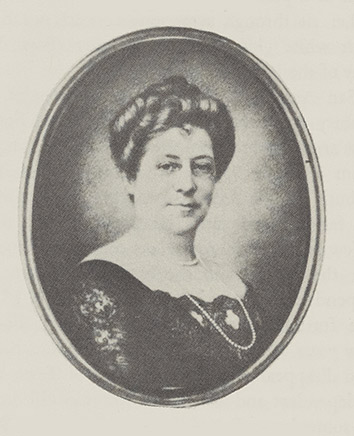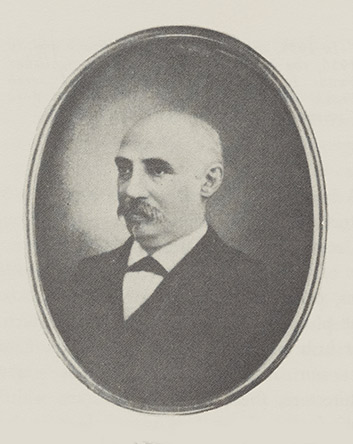The Frank sisters honored their parents who established a Texas dry goods business.
Abraham B. Frank (1847-1907)
Sarah Frank (1852-1914)
The San Antonio River, a narrow, shallow stream, meanders picturesquely through the center of San Antonio, Texas. There, in one of America’s oldest and most beautiful cities, peacocks and flamingos flaunt their plumage in Breckenridge Park, which is kept lush and green year-round by the Southwest sun. A large Mexican quarter imbues architecture, food, and local customs with an exotic foreign flavor. San Antonio became, above all, an aristocratic city, once described by a resident as a place inhabited by ladies who would rather sit through symphony concerts wearing white gloves than make ostentatious display of the jewels on their fingers.
San Antonio was not always so elegant. A century ago, when Abraham and Sarah Frank arrived there from the East, it had changed from a sleepy Spanish-American outpost into a burly Anglo-American market town visited by farmers and cattle ranchers. At that time, a few pioneer San Antonians could still remember the Alamo and the battle for Texas’ independence that had been fought in 1836 in the fortified mission outside of town. For a few years after the smoke of that famous battle had disappeared and the Republic of Texas was independent and secure, San Antonio still dozed in somnolence. But at the end of the Civil War, statehood brought new stirrings of activity, and the population began to grow. With the coming of the railroad in 1877, San Antonio awakened with a roar of rough vitality.
Into this free-wheeling, two-fisted milieu came Abraham and Sarah Frank, young New Yorkers of European background. Abraham, known as “A.B.,” was a rugged, adventurous, ambitious man who recognized, and was prepared to seize, the opportunities offered by a thriving new ranching town. Such an economy, with the burgeoning population it supported, required goods; Abraham knew how to supply them. In 1879, he established a wholesale grocery company, called the A.B. Frank Co. In 1891, he incorporated his prospering business, which then included dry goods as well. One San Antonio city directory of that decade carried a full-page ad for A.B. Frank Co.’s wholesale dry goods and groceries.

A few years later, Abraham formed a partnership, and the firm of Goldfrank, Frank & Co. was established, with dry goods rather than groceries as the principal commodities. In the meantime, Abraham invested part of his wealth in cattle, and he was a partner in the 165,000-acre Indio Ranch. A.B. Frank prospered right along with the growing Lone Star State.
A hearty, outgoing man, Abraham was perfectly at home in the rough-and-ready boom town. But not so his wife. San Antonio was not yet a city where ladies wore white gloves to concerts, and Sarah Frank was unhappy. She was an elegant, fastidious woman who had spent her early years in a well-to-do, formal household in the East, and she missed it dreadfully. During the hot Texas summers, Sarah took the children to stay at her family’s summer home in Greenwich, Connecticut, and left her husband in San Antonio. Finally, she persuaded Abraham to move back to New York. Abraham had never liked New York. He found it much too confining, and after the wide-open spaces of Texas, the city seemed unbearable. But to make his wife happy, he consented to leave Texas. For as long as he lived, however, he returned regularly to transact business and ranching affairs.
Abraham and Sarah had six children, all born in San Antonio. Of the five girls and one boy, Netta and Aline were especially close. Netta was born on October 1, 1875, not long after the Franks arrived in San Antonio. The youngest of the family, Aline, was born there on September 14, 1884. Despite dissimilar personalities and the nine years’ difference in age, the sisters became virtually inseparable. Neither married, although Netta was said to have been engaged to a man who later married one of her other sisters.
Netta and Aline accompanied Abraham and Sarah when they moved to New York at the turn of the century. Abraham lived only a few years after he left his beloved Texas. He was 60 when he died in New York in 1907. When Sarah died seven years later, at age 62, Netta was 39 and Aline was 30. For some years after their parents’ death, the two sisters continued to live in their parents’ home. Then, in 1928, they moved to a four-room apartment at the Warwick, a residential hotel on West 54th Street in New York City, where they pursued lives that were outwardly quiet and uneventful but intellectually vigorous.
Netta suffered from a hearing disability, but she had a strong personality and a direct, outspoken manner. She recognized, and lovingly accepted, an obligation to care for her younger sister. Aline, who was much smaller and more fragile, had a speech defect that caused her to stutter. Aline’s gentle disposition was often in striking contrast to her sister’s bluff nature.
Despite their apparent differences, Netta and Aline were both highly intelligent women who preferred to spend most of their time with books and periodicals and who were united in a common passion that dominated their reading, thinking, and conversation: politics.
The Frank sisters were staunch Republicans. They disapproved of Franklin Delano Roosevelt, who first attracted their attention when he became governor of New York in 1928. In 1932, the Democratic Party chose him to oppose incumbent Herbert C. Hoover for the presidency.
When the country elected Roosevelt as its 32nd president, Netta and Aline were distressed. The month after that election, in an unusual reversal of roles, Aline Frank, the normally passive sister, joined the Women’s National Republican Club. Netta became a member a year later. From then on, no public detail of the Roosevelt administration escaped their scrutiny and, usually, their censure. The sisters perused hundreds of magazines and newspapers, clipping out items to add to the dossiers they kept on leading political figures of their day.
As the sisters cast their ballots for Alfred M. Landon in 1936, for Wendell L. Willkie in 1940, and for Thomas E. Dewey in 1944, they hoped each time for the defeat of Roosevelt. By now, they seldom left their rooms at the Warwick except to walk to the Women’s National Republican Club, which had moved its headquarters to within a few blocks of their hotel.
But they enjoyed calls from close friends and looked forward to visits from their nephew and nieces. Aline and Netta were as intense in their loyalties as they were in their dislikes. They were unswerving in their devotion to one another and to other members of the somewhat loosely knit family. The two women lived by a strict code of etiquette that had always governed their lives, and they expected their young visitors to do the same. Nevertheless, even their very young grandniece and grandnephew, the last descendants of A.B. and Sarah, enjoyed calling on the lively aunts who were so aware of a world they saw only rarely firsthand.
Aline S. Frank, the gentle, sweet-smiling younger sister, died on April 28, 1954, at age 69, leaving her strong, protective older sister with no one to share her thoughts. A year later, on June 9, 1955, Netta L. Frank died. She was 79. The two sisters, who venerated their family’s past as they did that of their country and who cherished the memory of their parents as they did one another, chose to memorialize their father and mother, Abraham and Sarah Frank, through philanthropic funds established for the benefit of charitable institutions. Each provided in her will for a fund to be administered by The New York Community Trust.
